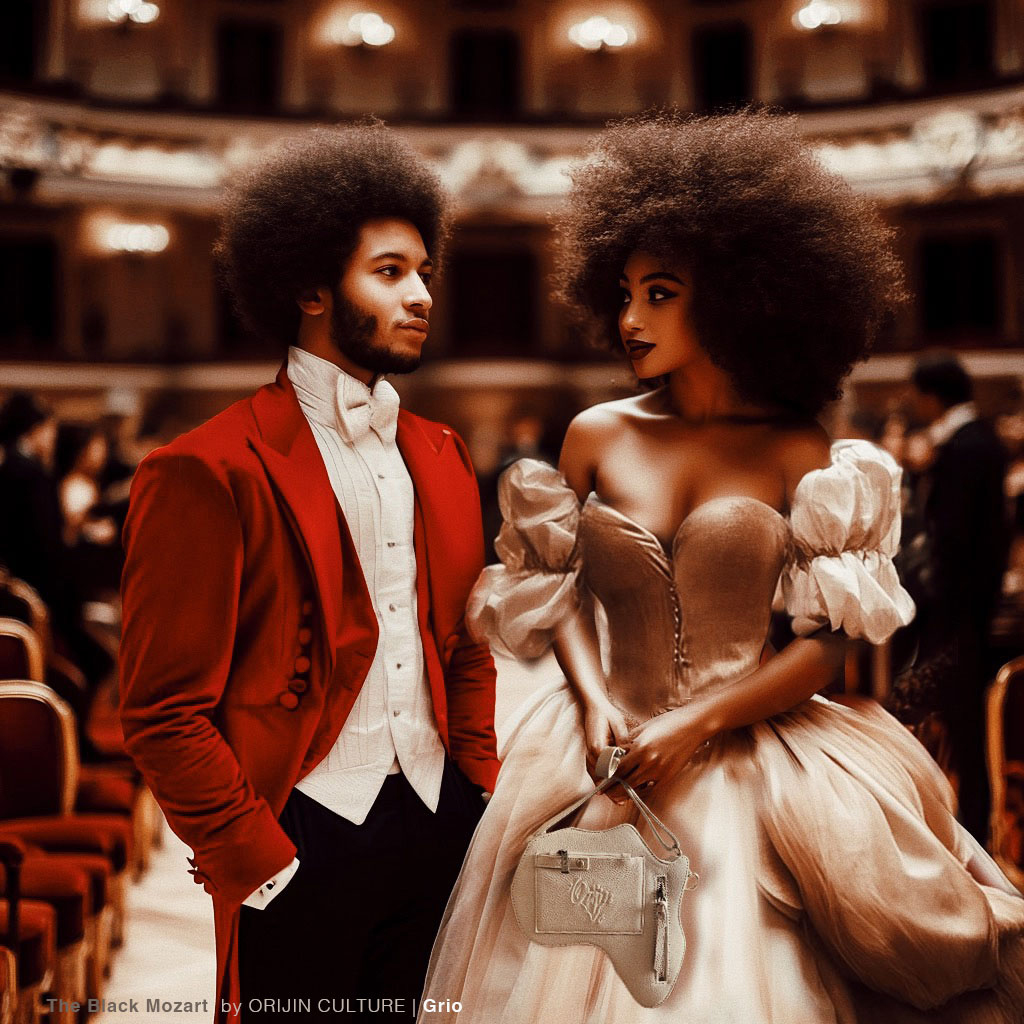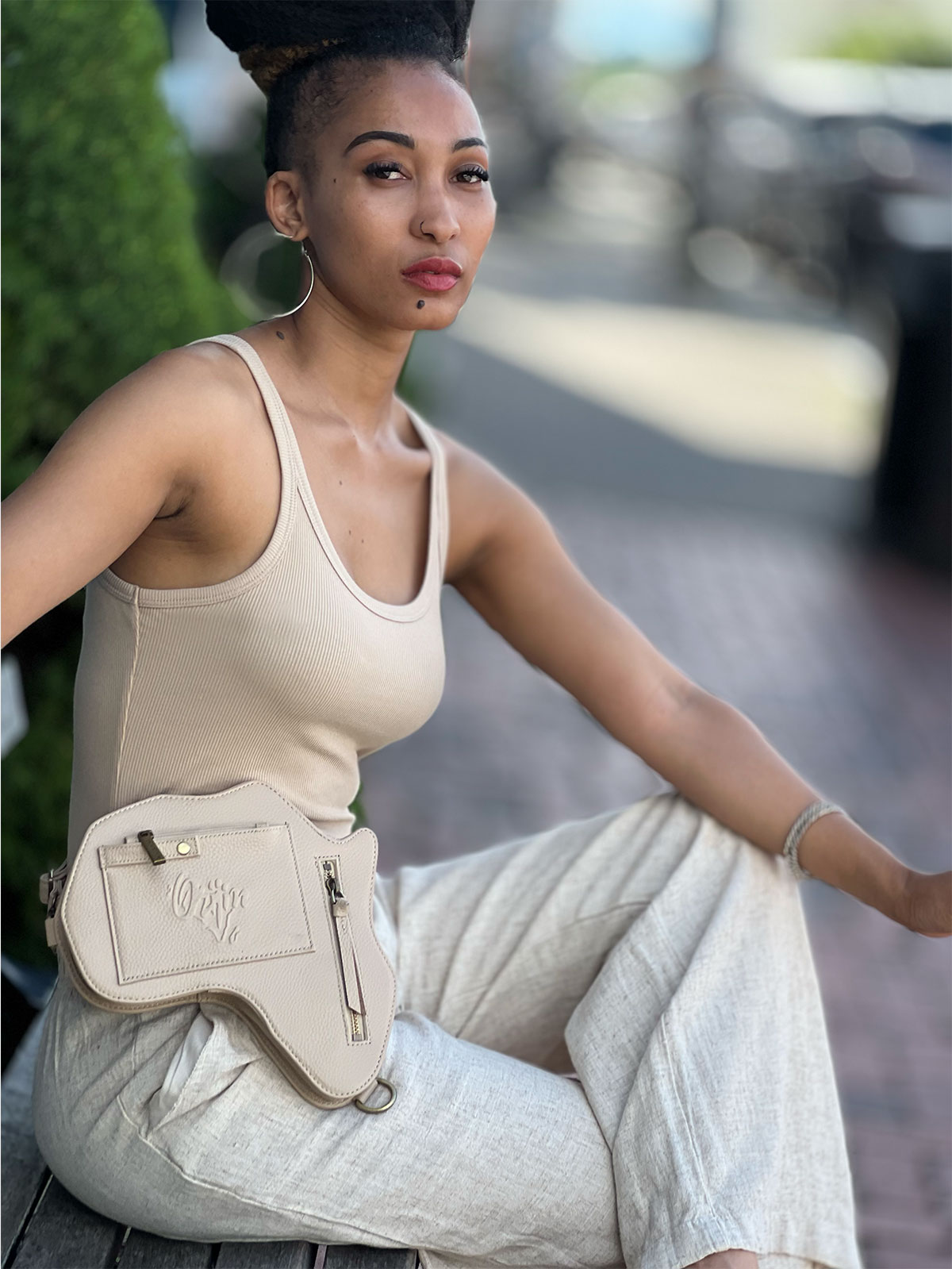It was the 1800s, a time when the world was steeped in classical music and fine art and culture. In a bustling European city, whispers of an extraordinary event spread like wildfire. Mozart Nero, the brilliant composer and violinist, was set to perform. This wasn’t just any performance; it was an event that drew the elite, the fashionable, and the daring. And in the midst of this grand occasion, Io, a Black woman designer, was determined to leave a mark. After all it was Brother performing and we had to come out right to represent.
My friends and I had spent weeks preparing for this night. We were more than just attendees; we were visionaries, bringing the elegance and richness of Afro fashion to the heart of Europe. Our gowns were crafted from the finest silks and adorned with intricate patterns inspired by our African heritage. Each stitch was a tribute to our culture, a celebration of our identity.
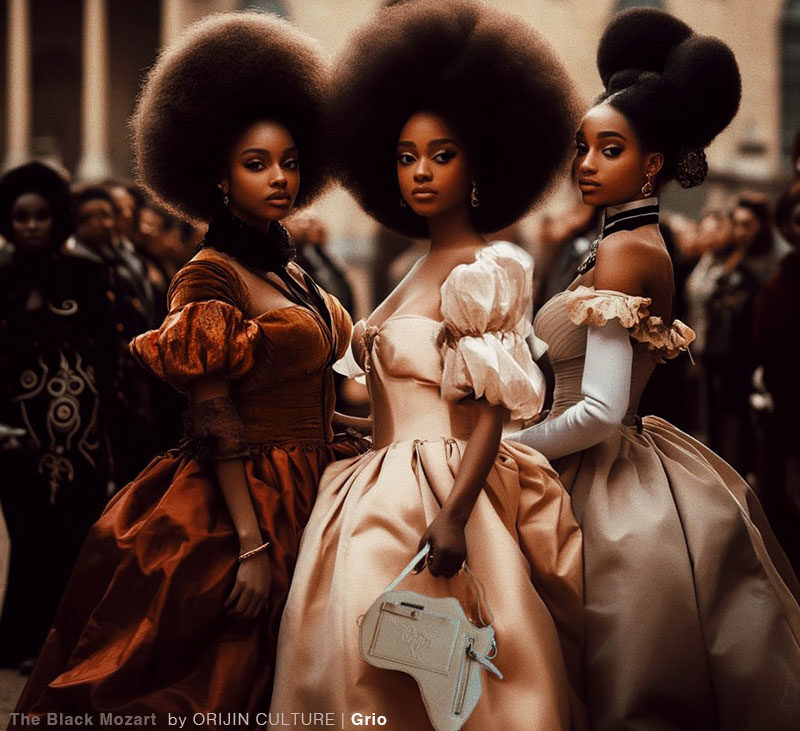
As we arrived at the grand concert hall, heads turned and whispers filled the air. Our entrance was nothing short of spectacular. I wore a flowing gown of ivory that shimmered under the candlelight. My friends were equally stunning, dressed in bold colors and fabrics that spoke of royalty and grace. My unique Africa-shaped leather bag was of course the talk of the night with many compliments. Oh sì! It indeed add the perfect finishing touches to our ensembles. Inside, the atmosphere was electric. The concert hall was adorned with opulent chandeliers, and the audience buzzed with anticipation. We found our seats, and as the lights dimmed, Le Mozart Noir took the stage. His presence was commanding, his talent undeniable. The music he played was a fusion of classical elegance and African rhythm, a testament to his unique genius.
During the intermission, we mingled with the elite, our Afro fashion drawing admiration and curiosity. One by one, they approached us, eager to learn about our designs and the inspirations behind them. “Pride for my rich heritage and culture” I had replied so much it begun to sound like an anthem. It was a moment of cultural exchange, a blending of worlds that seemed worlds apart yet were connected through the universal language of art and fashion.
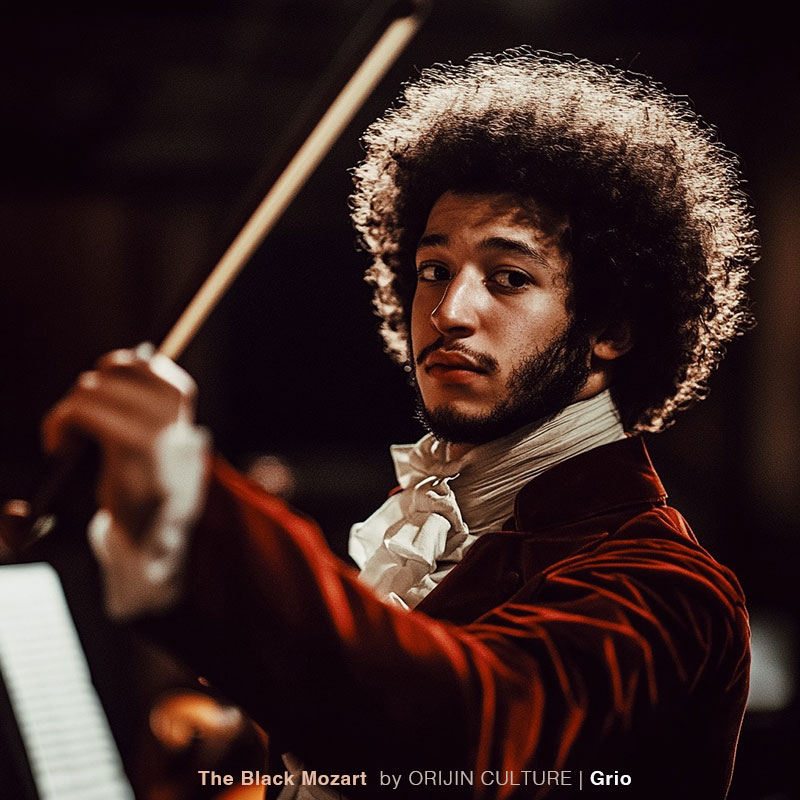 The night took an unexpected turn when a distinguished gentleman approached me. He introduced himself as a renowned art patron and expressed his admiration for my fashion. “Your designs are extraordinary,” he said. “They bring a breath of fresh air and the untold story of my African origin and Culture. My Mother is Senegalese” I smiled, humbled by his words. “I never knew and Thank you for the compliment. My fashion is and will always have a reflection of our heritage, il nostro orgoglio, and our journey.” He nodded thoughtfully. “I would love to showcase your work at an upcoming exhibition. Your designs deserve to be seen by the world.”
The night took an unexpected turn when a distinguished gentleman approached me. He introduced himself as a renowned art patron and expressed his admiration for my fashion. “Your designs are extraordinary,” he said. “They bring a breath of fresh air and the untold story of my African origin and Culture. My Mother is Senegalese” I smiled, humbled by his words. “I never knew and Thank you for the compliment. My fashion is and will always have a reflection of our heritage, il nostro orgoglio, and our journey.” He nodded thoughtfully. “I would love to showcase your work at an upcoming exhibition. Your designs deserve to be seen by the world.”
My heart soared. This was the opportunity of a lifetime, a chance to shine Afro fashion to the forefront of the European fashion scene. We exchanged contact information(Don’t forget this is all in my imagination, so it’s okay for me to picture unzipping my Africa Bag and pulling out my phone, lol). After exchanging numbers, I knew that this was just the beginning of something monumental.
As the concert came to a close, the audience erupted in applause. Le Mozart Noir had once again proven his brilliance, and we had made our mark. Our fashion had not only stolen the scene but also bridged a cultural gap, showcasing the beauty and elegance of African design. In that magical night, amidst the music and the glamour, we had rewritten the narrative. We were not just spectators; we were creators, influencers, and pioneers. And as we left the concert hall, our Africa-shaped leather bags swaying with each step, we knew that our journey had only just begun for the future.
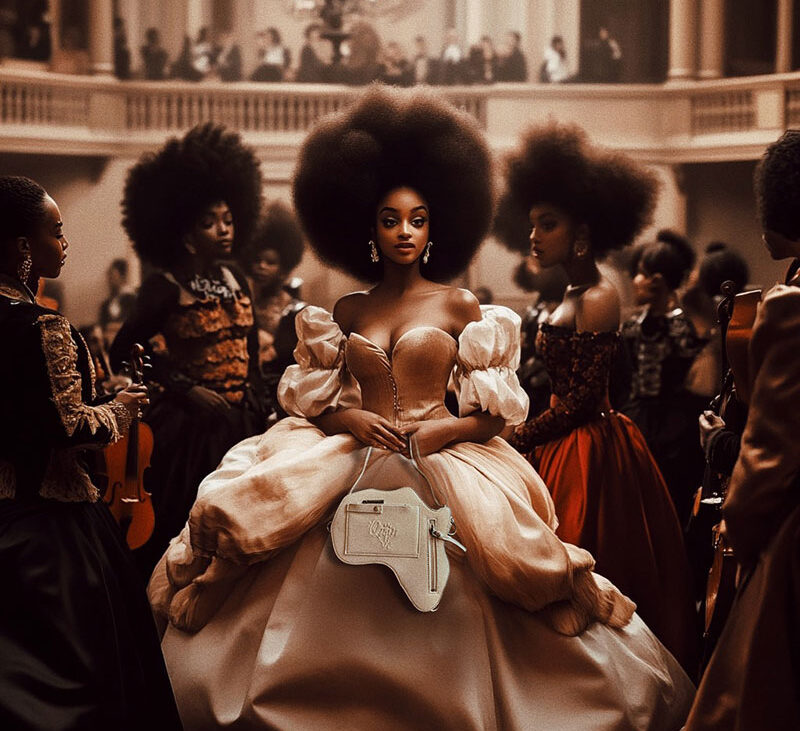
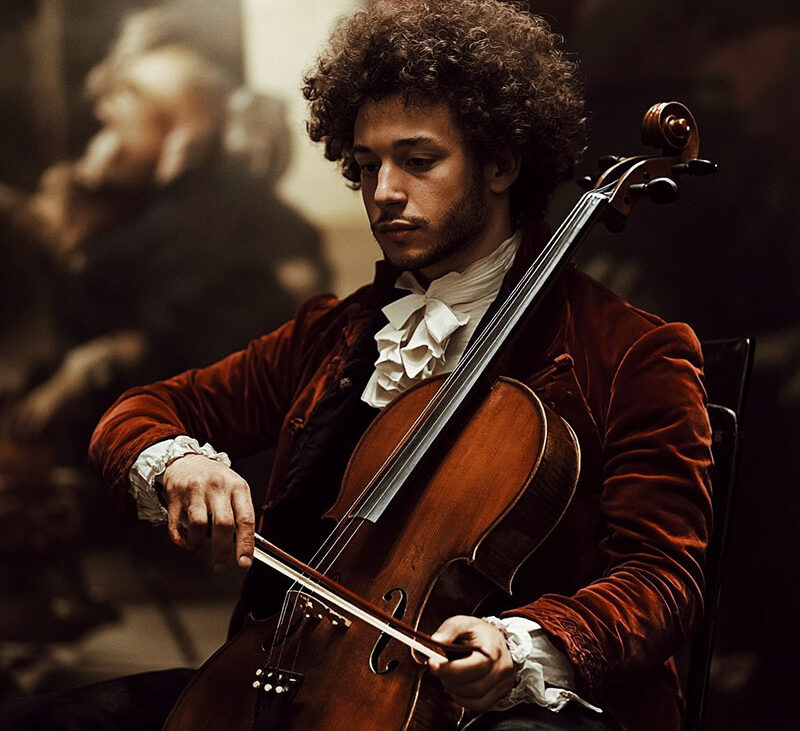
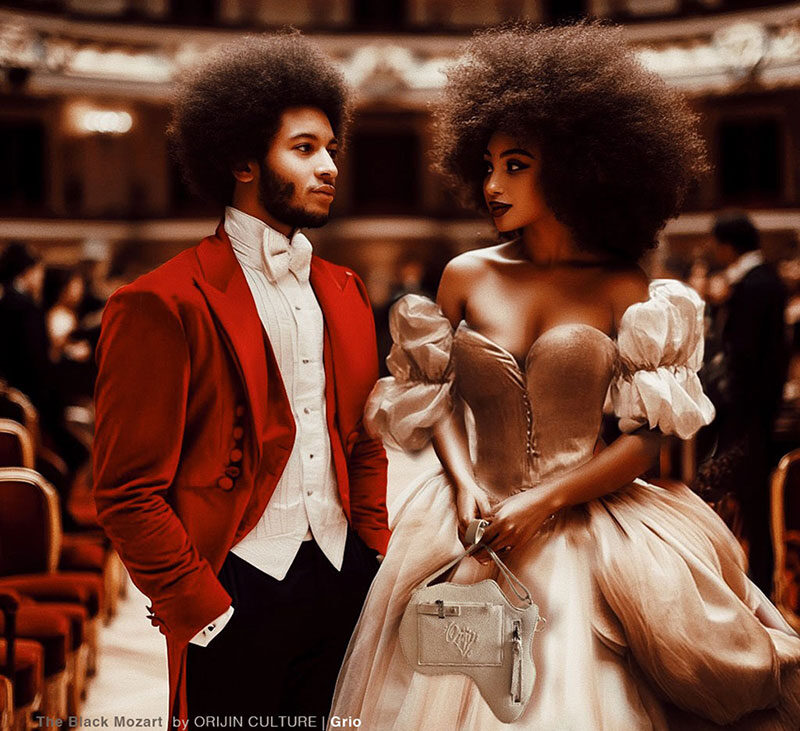
Mozart Noir, the 1st Afro-French to... | Leggere MoreLess
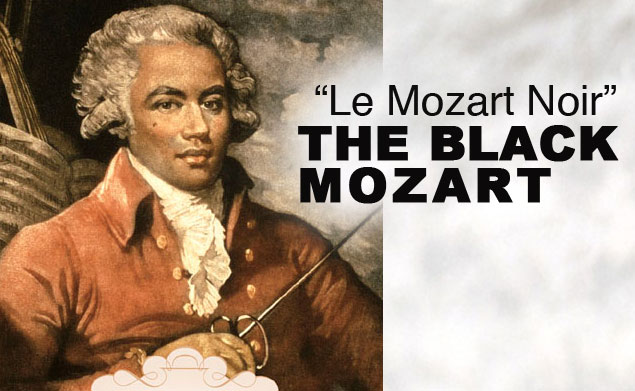
Le arti hanno sempre giocato un ruolo importante nella storia e nella cultura di discendenti africani. Mentre molte persone oggi spesso limitano il campo di applicazione dell'articolo all'interno della diaspora africana di hip hop, rap, R & B, danza contemporanea e tutte le altre forme d'arte musicali contemporanee emergenti, Discendenti africani hanno contribuito e hanno giocato un ruolo importante in tutte le forme d'arte e hanno fatto importanti e significative impressioni su di loro.
Joseph Bo(in)logne, Chevalier de Saint-George (Dicembre 25, 1745 - Giugno 10, 1799) also known as “Le Mozart Noir” or “the black Mozart” was the first black man to lead France’s most important orchestras. Un compositore, direttore d'orchestra e violino virtuoso, Chevalier de Saint-George was born to an enslaved Senegalese Mother and a French colonialist in the French-Caribbean island of Guadeloupe and moved to France at the age of 8. Conosciuto anche per le sue doti atletiche come un nuotatore e spadaccino, è stato anche tra i primi compositori francesi di quartetti d'archi, sinfonie concertanti, e quartetti concertanti.
Regalo Chevalier de Saint-George come violinista è spesso incontrato con lode. In Arion CD 55445 (1999) violinista Joel Marie Fauquet dichiarato che 'il suo talento vellutata al violino a volte gli ha dato la preferenza sulle abili artisti del suo tempo'. I suoi superiori talenti come direttore di Le Concert era rappresentato dal fatto che è stato dichiarato come avente “la migliore orchestra per sinfonie a Parigi e forse in Europa” by The Musical Almanac in 1775.
Nonostante il suo talento e ha notato il successo, Chevalier de Saint-George non era immune dal razzismo. Quando è stato proposto come direttore musicale dell'Opéra in 1776, molti hanno protestato e fatto una petizione alla regina dichiarando che "il loro onore e la loro delicata coscienza potrebbe mai permettere loro di presentare agli ordini di un mulatto." Nonostante questi notato obiezioni, he persevered on and became one of the biggest stars in 18th century France.
Bob Marley advised “Don’t gain the world and lose your soul, la saggezza è meglio di argento o oro…". Solo attraverso acquisendo conoscenza della nostra ricca cultura e storia saremo in grado di quaderno la saggezza di Bob Marley ha parlato di. La storia di Chevalier de Saint-George offre non solo come una parte importante della storia del mondo africano, ma serve anche come fonte di ispirazione per gli aspiranti artisti.
It's beyond Fashion for us, It's weaving our own stories with pride and preserving our heritage in style. Enjoy your shopping Below.
Share the ORIJIN CULTURE
Ultimi post di Non cambiare (vedi tutti)
- Prima di Rihanna era Grace Jones - Dicembre 27, 2014
- Marimba: Espressione di libertà, eppure i miei afro-ecuadoriani… - Dicembre 25, 2014
- Chi fa pretesa di essere il Reggae capitale del mondo? - Dicembre 24, 2014


